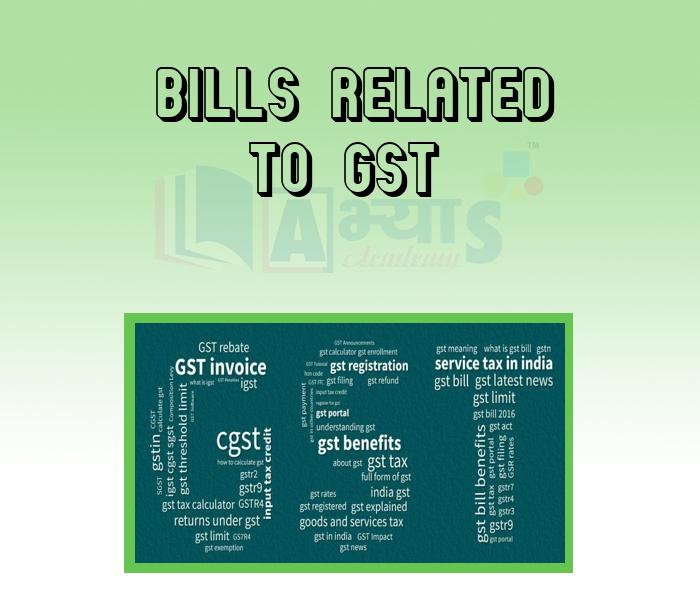Bills Related To GST










Bills Related To GST
Bills Related to GST: The Cabinet chaired by Prime Minister Narendra Modi approved the Central Goods and Services Tax Bill 2017 (the CGST Bill), the Integrated Goods and Services Tax Bill 2017 (the IGST Bill), the Union Territory Goods and Services Tax Bill 2017 (the UTGST Bill) and the Goods and Services Tax (compensation to the states) Bill 2017 (The Compensation Bill). To make the Customs Act and Excise Act compliant with GST, Lok Sabha has passed The Taxation (Amendment) Bill 2017 on 6th April 2017.
(1) Central GST Bill: The CGST Bill sets the tax regime for levying and collection of GST on supply of goods and/or services that are happening within the boundaries of a state by the Central Government.
(2) Integrated GST Bill: The IGST bill decides the tax regime for levy and collection of GST on supply of goods and/or services carried out between different states by the Central Government.
(3) Union Territory GST Bill: The UTGST fixes the tax regime for levying and collection of GST on supply of goods and services in the Union Territories without legislature.
(4) The Compensation Bill: The Compensation bill will compensate the states for loss of revenue, which may occur due to the implementation of GST, for a period of five years.GST Constitutional Amendment Bill omits entries 92 and 92C from the Union List and entries 52 and 55 from the State List of the Seventh Schedule.
Differential treatment for alcohol, tobacco and petroleum products:
(1) Alcoholic liquor, for human consumption, has been excluded from the purview of GST. The definition of goods and services tax in the proposed clause (12A) to be inserted in Article 366 of the Constitution is "tax on the supply of goods or services or both (except tax on the supply of alcoholie liquor for human consumption)." The manufacture and sale of the product will continue to be taxed by states.
(2) Tobacco and tobacco products will be subject to central excise duty in addition to GST. While not excluded from GST, it is retained in entry 84 of List I (union list).
(3) Petroleum products are excluded from GST for the present, and will continue to be taxed in the present mode - central excise duty on manufacture and VAT/CST on sale. However, the proposed Constitutional amendment requires the GST Council to fix the date by which these products will be brought into the purview of GST. This is in clause (5) of the proposed Article 279A, Goods and Services Tax Council (GSTC), inserted by the Constitution (1014 Amendment) Act.
Students / Parents Reviews [10]
Being a parent, I saw my daughter improvement in her studies by seeing a good result in all day to day compititive exam TMO, NSO, IEO etc and as well as studies. I have got a fruitful result from my daughter.

Prisha Gupta
8thAbout Abhyas metholodology the teachers are very nice and hardworking toward students.The Centre Head Mrs Anu Sethi is also a brilliant teacher.Abhyas has taught me how to overcome problems and has always taken my doubts and suppoeted me.

Shreya Shrivastava
8thIt has a great methodology. Students here can get analysis to their test quickly.We can learn easily through PPTs and the testing methods are good. We know that where we have to practice

Barkha Arora
10thMy experience was very good with Abhyas academy. I am studying here from 6th class and I am satisfied by its results in my life. I improved a lot here ahead of school syllabus.

Ayan Ghosh
8thMy experience with Abhyas academy is very good. I did not think that my every subject coming here will be so strong. The main thing is that the online tests had made me learn here more things.

Hiya Gupta
8thAbhyas Methodology is very good. It is based on according to student and each child manages accordingly to its properly. Methodology has improved the abilities of students to shine them in future.

Manish Kumar
10thMy experience with Abhyas is very good. I have learnt many things here like vedic maths and reasoning also. Teachers here first take our doubts and then there are assignments to verify our weak points.

Shivam Rana
7thOne of the best institutes to develope a child interest in studies.Provides SST and English knowledge also unlike other institutes. Teachers are co operative and friendly online tests andPPT develope practical knowledge also.

Aman Kumar Shrivastava
10thIt was good as the experience because as we had come here we had been improved in a such envirnment created here.Extra is taught which is beneficial for future.

Eshan Arora
8thI have spent a wonderful time in Abhyas academy. It has made my reasoning more apt, English more stronger and Maths an interesting subject for me. It has given me a habbit of self studying
